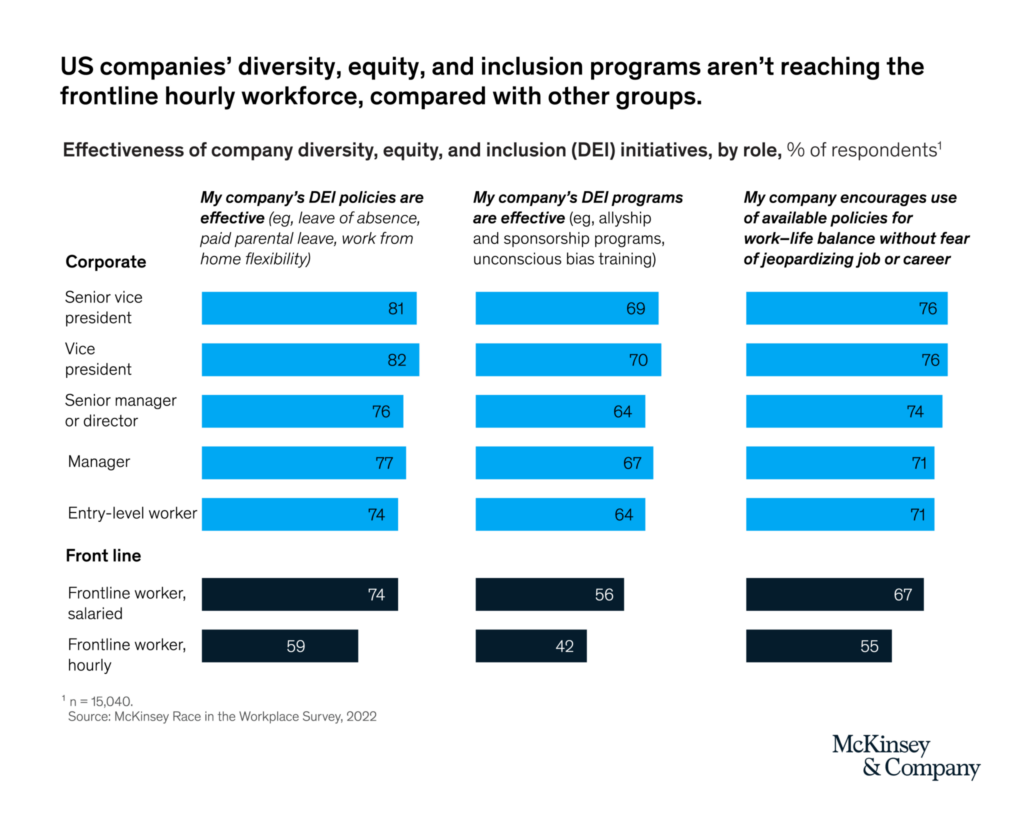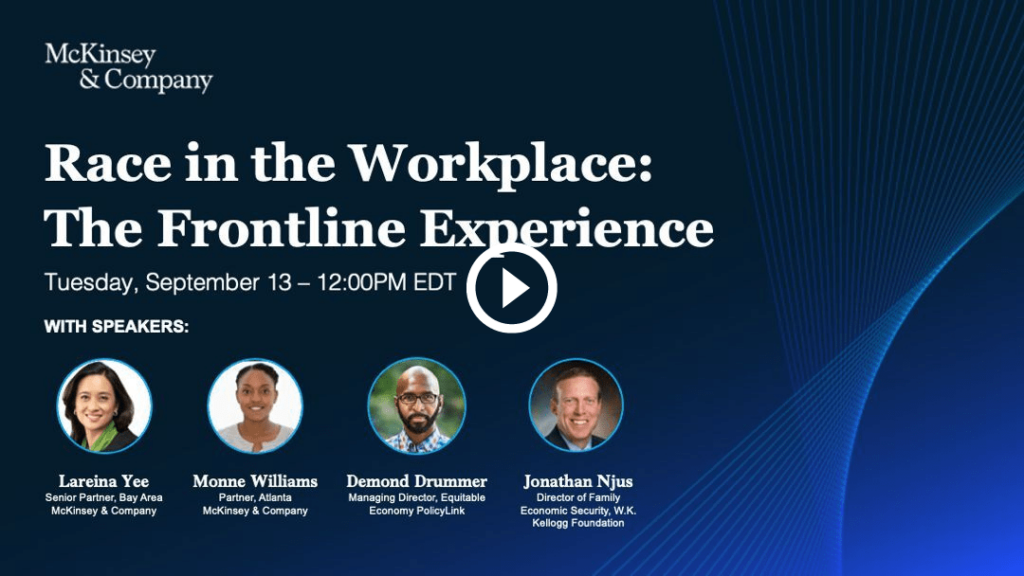Jonathan Njus, the director of Family Economic Security and team lead for the Expanding Equity program at the W.K. Kellogg Foundation (WKKF), recently spoke on a webinar highlighting findings from the WKKF-supported report, “Race in the Workplace: The Frontline Experience.” He spoke to how companies and leaders can facilitate career growth for their frontline employees through their diversity, equity and inclusion (DEI) efforts.
Watch and learn more about the experiences of frontline workers of color and the Kellogg Foundation’s commitment to helping companies better support economic mobility, opportunity and job quality for employees.
Frontline workers are essential to our economy but are left out of DEI initiatives that create opportunities for advancement in their companies.
The pandemic revealed the vital contributions of frontline workers to our everyday lives and the economy. Yet, companies often do not extend the same career development opportunities through their DEI programs to frontline employees – often employees of color. And while the programs’ reach is limited, frontline workers are most certainly looking for opportunities.
Key findings from the Race in the Workplace report tell us:
- 70% of frontline workers want to advance in their companies, but just one-in-four will.
- Black, Hispanic/Latinx and Asian frontline workers’ desire for promotion is higher than White workers, and there is a sizable gap (22%, 30% and 28% respectively) between that desire and their actual opportunity to advance.
- Only 4% of frontline employees will make the leap to corporate positions, and only 30% will move to a higher-income quintile during their career.
- Only 42% of frontline workers agree their companies’ DEI programs are effective, compared to 70% at the VP level.
- 45% of hourly employees do not believe their company encourages them to take advantage of work-life policies, such as leave of absence and parental leave, without jeopardizing their career or employment advancement.
- Employees are five times more likely to get a promotion if they have four or more “sponsors,” or coworkers with the ability and willingness to help promote another colleague’s career.
- Black, Hispanic/Latinx and Asian frontline employees report having fewer mentors and sponsors, which is crucial to career advancement.
You invest in what you value, and companies have a tremendous opportunity to show how much they value their frontline workforce by investing in their personal growth and career development.
Jonathan Njus
Additionally, Njus shared that the Kellogg Foundation “has learned, through some of its grant-funded projects, the need to embed career services within the company” to support frontline workers. For example, the R.I.S.E. Up Program in Grand Rapids, Michigan, a collaboration among Trinity-Mercy Health, The SOURCE and West Michigan Works, created a dedicated career development office with coaching, resources and support services to help employees identify and choose paths within the hospital that interest them and enroll in relevant training. As a result, wages among frontline workers at the hospital increased by more than $1 million via promotion or hire in a little more than two years. This also helped create a more diverse workforce as new hires were attracted to and took advantage of these opportunities.

Sponsorship is key to promotion, and White men can play a leading role in sponsoring frontline employees.
Another thing to remember is that the responsibility for frontline worker career advancement should not fall entirely on the worker. The hard work and deep desire of frontline workers to advance in their careers must be met with the active sponsorship and support of managers and leaders to make advancement a possibility and a reality. According to the report, employees are five times more likely to get a promotion if they have four or more “sponsors,” or coworkers with the ability and willingness to help promote another colleague’s career. Yet, Black, Hispanic/Latinx and Asian frontline employees are not sponsored to the same degree as their White colleagues.
According to Njus, “Something we learned as a part of our Expanding Equity [program] is the importance of White allies – especially White men – [and] how they can use their privilege to actively sponsor frontline employees.”
He emphasized that White allies could support frontline employees of color by raising employees’ profiles, highlighting their achievements, and connecting them with a sponsor’s personal network. This includes promoting frontline workers when advancement opportunities arise and defending them when need be, specifically women of color.
Additionally, Njus drew attention to the report’s finding that while frontline employees report the lowest overall feelings of inclusion at companies, Black employees feel less included in the workplace than their peers at most levels. This tells companies that sponsorship should not end when someone is promoted. Support for employees of color should be at both the front and back end of the promotion process, when they might feel more isolated and alone, to ensure their success in their new role.
Job quality is a key component of DEI and career mobility.
Frontline employees are looking to move up and change jobs for the same reason others do: a desire for more responsibility and access to greater opportunities. They are also searching for more stability and security – often not by choice, but by necessity. Njus shared that the quality of a job is determined not only by salary and benefits but also through child care assistance, flexible scheduling, and paid leave. Organizations should offer frontline workers opportunities to take advantage of these supports without any type of retaliation. There is a distinct fear among nearly half (45%) of frontline employees that taking leave, for example, will jeopardize their employment or career advancement. Companies can improve job quality for frontline employees by prioritizing both fair compensation and holistic supports, creating more security and feelings of inclusion, which help with employee retention.
Extending career growth opportunities to frontline workers is an effective way to create more equitable workplaces, aka the “E” in DEI. The lack of representation and inclusion experienced by frontline employees of color can change by investing more money, time, training, coaching, connections and support in their development. By taking a more expansive approach to DEI and centering employees of color in it, companies can make greater inroads in diversifying their workforce, strengthening their culture and increasing their organizational well-being.
Download the full Race in the Workplace report here.


